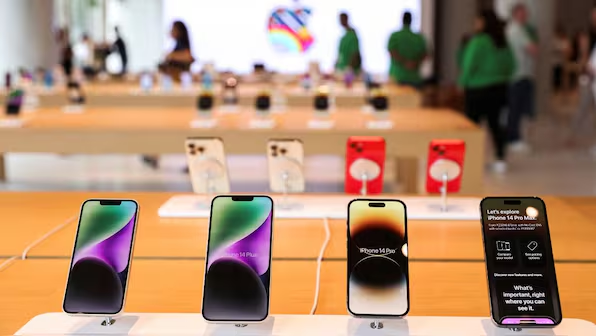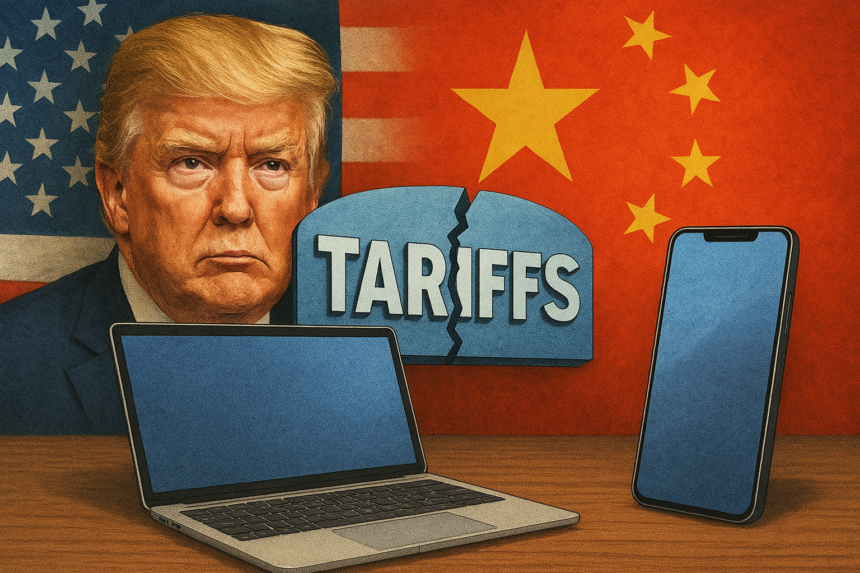President Donald Trump has decided to exempt smartphones, computers, and key electronic components from the escalating tariffs imposed on goods imported from China to ease growing concerns over trade relations. This moratorium softens the economic blow to tech companies and consumers facing price increases on electronics due to the ongoing U.S.-China trade dispute. The exemption comes at a time when global supply chains and consumer prices have been under increasing pressure.
What’s Happening & Why This Matters
President Trump’s decision to exempt electronics like smartphones, laptops, and other tech products from Chinese tariffs marks a pivotal change in his administration’s approach to trade tariffs. While the administration initially set high tariffs, affecting a wide range of products from China, the impact on tech companies has been substantial. With major players like Apple and Microsoft relying heavily on Chinese manufacturing for their products, the tariffs have driven up costs for consumer electronics.
The exemption from tariffs on smartphones and computers will relieve these companies, which had been facing the dilemma of either absorbing the added costs or raising prices on their products. This decision is temporary to avoid further price hikes on products consumers depend on. For example, Apple’s iPhone, a leading product in the U.S. market, could have seen significant price increases due to these tariffs. In the short term, this exemption helps stabilize smartphone prices, supporting consumer demand.

Although the tariff exemption is a short-term solution, it’s also part of a broader effort to reduce the strain on U.S. consumers. Higher import duties have threatened gaming consoles, computers, and other devices integral to daily life, entertainment, and work. By removing the tariff on these items, President Trump aims to protect American consumers from unexpected increases in tech product prices during economic uncertainty.
This move may also signal the administration’s intent to balance trade negotiations with the economic realities of global technology supply chains. With technology becoming a significant part of the global economy, tariffs on tech imports had the potential to harm U.S. companies and weaken global competitiveness. By exempting key electronics, the U.S. may attempt to ensure that technology companies remain strong, competitive, and resilient in an increasingly globalized market.
Industry and Consumer Price Impacts

The tariff exemptions are a game-changer for tech companies that rely heavily on Chinese production for critical components and final assembly of their products. For American companies, including Apple, Dell, and Microsoft, the tariff relief on computers and smartphones is a welcome relief. These companies had previously warned of rising prices and potential delays in product deliveries due to the higher costs of components affected by the tariffs.
Apple, which sources most of its smartphone production from China, has been particularly vulnerable to tariff increases. The company has warned that U.S. consumers would be hit with higher prices if tariffs on Chinese imports continued to climb. The exemption allows Apple and other companies to stabilize their pricing strategies in a challenging market. This will help maintain demand for tech products, especially as the world navigates through post-pandemic economic conditions.
Nvidia, Intel, and other semiconductor manufacturers also benefit from these tariff exclusions, which affect key components used in computers, graphics cards, and AI hardware. As more companies turn to advanced AI technologies and high-performance computing, the exemption will help reduce costs and allow companies to keep their products competitive in both domestic and international markets.
However, this exemption is not a permanent fix. While it addresses immediate concerns, the longer-term implications of ongoing trade tensions between the U.S. and China remain unresolved. As the two countries continue negotiations on issues like intellectual property and trade imbalances, the future of tariffs remains uncertain. It will be important for tech companies to adapt to these fluctuations in trade policy to avoid disruptions in their global supply chains.
TF Summary: What’s Next
President Trump’s decision to exempt smartphones and computers from tariffs provides a temporary but critical reprieve for the U.S. tech industry and consumers. While the exemptions help stabilize pricing for popular tech products, the trade war with China poses long-term challenges. Tech companies must remain flexible in responding to potential trade policy and tariff regulations shifts. The tariff exemptions may give companies some breathing room, but the broader issues surrounding trade negotiations and global manufacturing remain unresolved.
— Text-to-Speech (TTS) provided by gspeech


